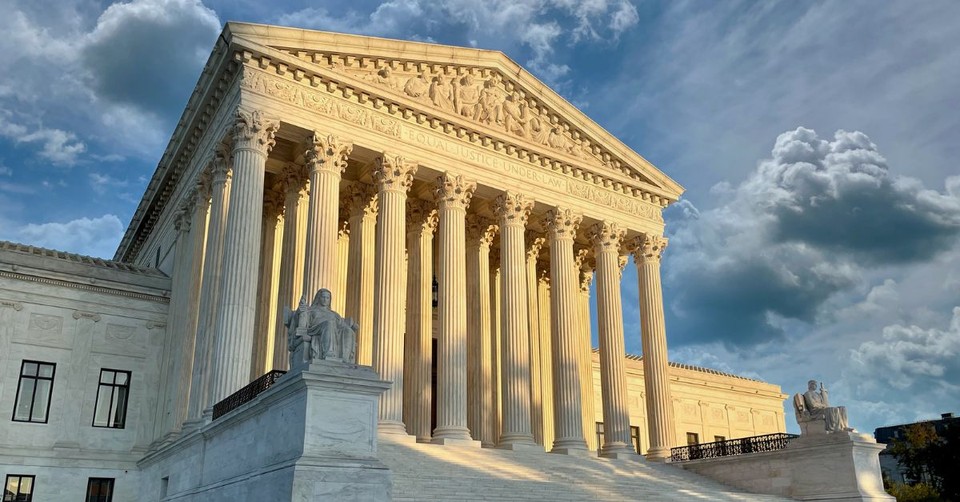Supreme Court Hands Social Conservatives Big Wins on LGBT Books and Anti-Porn Laws

Social conservatives scored two major victories on the Supreme Court’s final decision day Friday, as justices first sided with religious parents in a dispute about opt-outs over LGBT-themed books and then upheld a Texas law requiring age verification for online pornography. Both decisions likely will have major impacts on the political and legal realms in the U.S. for decades to come. Additionally, both decisions came via 6-3 splits, with the court’s conservative bloc forming the majorities.
Ruling in Favor of Religious Parents
In the school case, the Supreme Court ruled in favor of religious parents who had sued the Montgomery County, Md., Board of Education after being denied advance notice that LGBT-inclusive books would be read to their elementary-aged children. The parents -- who had asked for an opt-out -- argued the schools’ denial violated their religious liberties guaranteed under the U.S. Constitution.
Justice Samuel Alito, who was nominated by President George W. Bush, wrote the majority opinion, ruling that the parents were entitled to a preliminary injunction against the school system.
“A government burdens the religious exercise of parents when it requires them to submit their children to instruction that poses ‘a very real threat of undermining’ the religious beliefs and practices that the parents wish to instill,” Alito wrote. “And a government cannot condition the benefit of free public education on parents’ acceptance of such instruction.”
Alito added, “We express no view on the educational value of the Board’s proposed curriculum, other than to state that it places an unconstitutional burden on the parents’ religious exercise if it is imposed with no opportunity for opt outs.”
Joining Alito’s opinion were Chief Justice John Roberts and Justices Clarence Thomas, Neil Gorsuch, Brett Kavanaugh and Amy Coney Barrett.
Court Upholds Texas Pornography Law
In the porn case, the justices upheld a Texas law, H.B. 1181, that requires pornographic websites to verify that their users are adults before accessing the content. At least 21 other states have similar laws.
Companies that operate such websites sued the state of Texas, arguing that the law burdens their freedoms under the Free Speech Clause of the First Amendment.
Justice Thomas, in writing for the majority, said the law does not run afoul of constitutionally protected freedoms. He was nominated by President George H.W. Bush.
“The statute advances the State’s important interest in shielding children from sexually explicit content,” Thomas wrote. “And, it is appropriately tailored because it permits users to verify their ages through the established methods of providing government-issued identification and sharing transactional data.”
Responding to privacy concerns from the pornographic companies, Thomas wrote that “the use of pornography has always been the subject of social stigma. This social reality has never been a reason to exempt the pornography industry from otherwise valid regulation.”
Joining Thomas were Roberts, Alito, Gorsuch, Kavanaugh and Barrett.
Reactions from Conservative Legal Advocates
Legal groups who specialize in social conservative causes applauded both decisions.
“As the internet becomes easier for minors to access, so too does explicit material,” said John Bursch, senior counsel for Alliance Defending Freedom. “Research shows that young people exposed to pornography suffer from increased rates of depression, anxiety, violent behavior, sexual promiscuity and abuse, trafficking, and distorted views of relationships between men and women. Texas has every right to pass laws that protect children from these types of harms, and in no way do these laws violate anyone’s constitutionally protected freedom of speech. Our legal system recognizes that the government has a vested interest in regulating obscene material.”
Kayla Toney, counsel for First Liberty Institute, said the school decision benefits parental rights nationwide.
“The U.S. Supreme Court today strengthened the rights of parents by ensuring that they have a say when it comes to the education of their children, especially when families’ religious beliefs are at stake,” Toney said. “Our children do not belong to the state, and the government should not be able to hide what it’s teaching in schools simply because it doesn’t agree with parents’ values or religious beliefs.”
The school case is Mahmoud v. Taylor. The pornography case is Free Speech Coalition, Inc. v. Paxton.
Photo Credit: ©Getty Images/Douglas Rissing
Michael Foust has covered the intersection of faith and news for 20 years. His stories have appeared in Baptist Press, Christianity Today, The Christian Post, the Leaf-Chronicle, the Toronto Star and the Knoxville News-Sentinel.
Listen to Michael's Podcast! He is the host of Crosswalk Talk, a podcast where he talks with Christian movie stars, musicians, directors, and more. Hear how famous Christian figures keep their faith a priority in Hollywood and discover the best Christian movies, books, television, and other entertainment. You can find Crosswalk Talk on LifeAudio.com, or subscribe on Apple or Spotify so you never miss an interview that will be sure to encourage your faith.
Originally published June 27, 2025.







